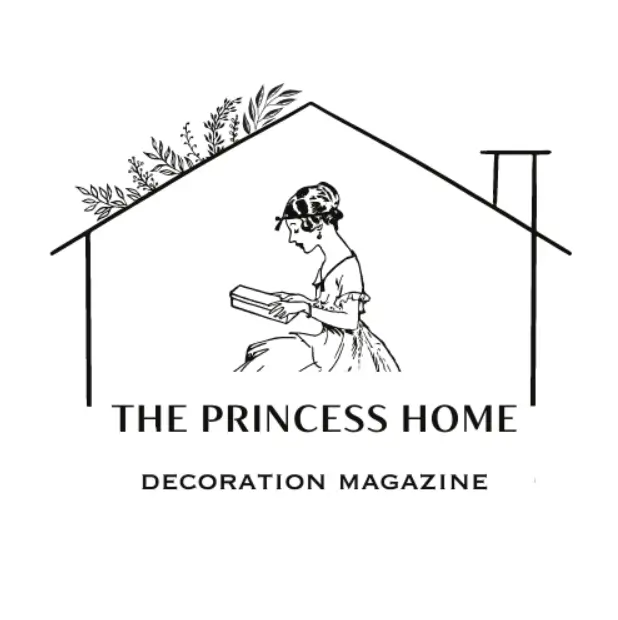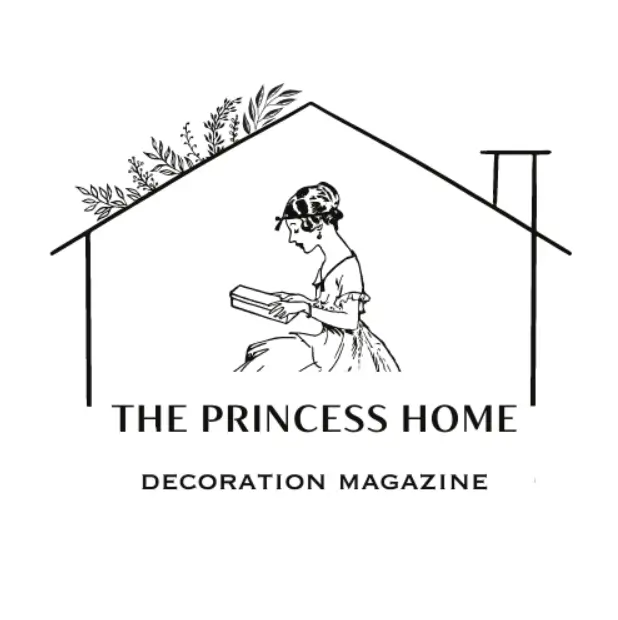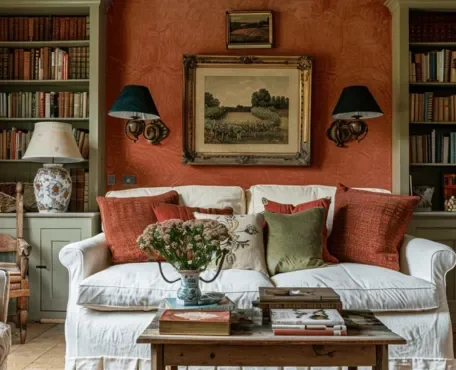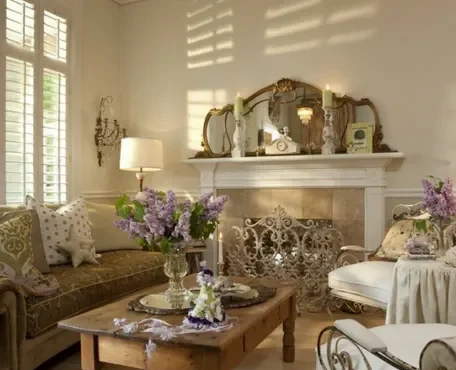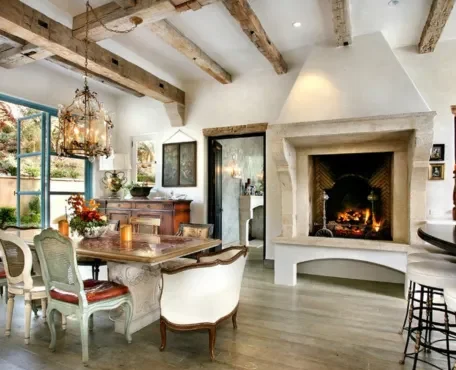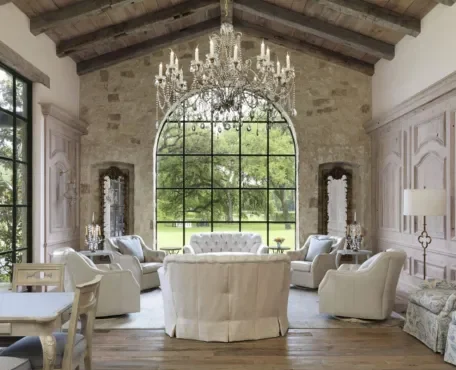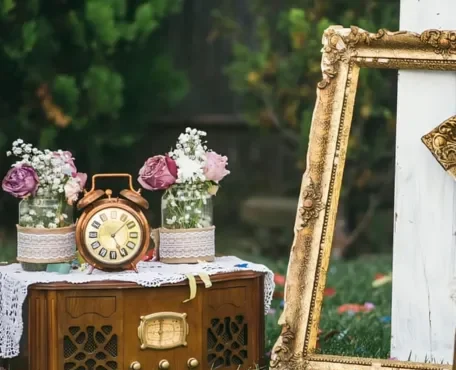
Shabby chic, with its charming blend of vintage elegance and relaxed comfort, has become a beloved interior design style for many homeowners. Originating in the 1980s, this aesthetic draws inspiration from English country cottages and French countryside homes, blending rustic elements with feminine touches. Achieving the perfect balance between worn-out charm and refined elegance can seem daunting, but with the right tips and tricks, anyone can master the art of shabby chic décor.
In this article, we’ll delve into various techniques and strategies to help you infuse your home with the timeless allure of shabby chic.
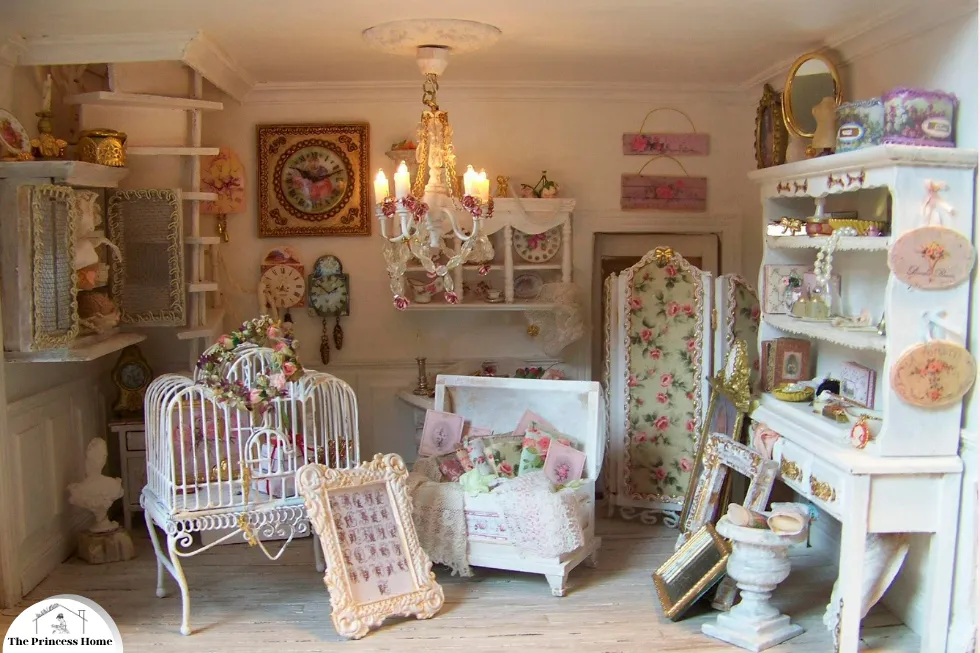
1.*Embrace Vintage Finds:
Central to the shabby chic style is the incorporation of vintage furniture and décor pieces. Scour flea markets, antique shops, and thrift stores for unique finds with character. Look for distressed finishes, ornate details, and weathered patinas that exude a sense of history and charm. Incorporate items like weathered wooden tables, antique picture frames, and vintage mirrors to add depth and personality to your space.
Embracing vintage finds can truly infuse your space with character and charm! It’s amazing what treasures you can unearth in flea markets, antique shops, and thrift stores. The beauty of shabby chic style lies in the imperfect, weathered look of these pieces that tell a story of their own.

When hunting for vintage items, keep an eye out for distressed finishes, ornate details, and those wonderful weathered patinas that evoke a sense of history. A weathered wooden table can become the centerpiece of a room, while antique picture frames and vintage mirrors add layers of personality and depth to your decor.
Don’t be afraid to mix and match different pieces to create a unique and eclectic look that reflects your personal style. And remember, the beauty of vintage finds lies not only in their aesthetics but also in the stories they carry with them. Happy hunting!
Here are some helpful tips: to purchasing vintage antique finds.
1.Have a Vision:
Before you start shopping, have a clear idea of the aesthetic you want to achieve in your space. This will help you stay focused and make informed decisions when selecting items.
2.Inspect Carefully:
Vintage pieces often come with signs of wear and tear, which add to their charm. However, make sure to inspect items thoroughly for any structural damage or flaws that may affect their usability or aesthetics.
3.Look for Authenticity:
While shopping, keep an eye out for genuine vintage pieces rather than mass-produced replicas. Authentic vintage items tend to have unique characteristics, such as handcrafted details or aged patinas, that set them apart.
4.Consider Functionality:
While aesthetics are important, also consider the functionality of the vintage pieces you’re purchasing. Ensure that they serve a purpose in your space and can be integrated seamlessly with your existing decor.
5.Mix and Match:
Don’t feel constrained by sticking to a specific time period or style. Embrace the eclectic nature of shabby chic by mixing vintage finds with modern elements to create a harmonious balance of old and new.
6.Negotiate Prices:
Don’t hesitate to negotiate prices, especially when shopping at flea markets or thrift stores. Sellers may be willing to offer discounts, particularly if you’re purchasing multiple items or if the piece has been on display for a while.
7.Measurements Matter:
Before making a purchase, take measurements of the space where you plan to place the vintage item. This will help ensure that it fits proportionally and doesn’t overwhelm or underwhelm the area.
8.Trust Your Instincts:
Ultimately, trust your instincts when selecting vintage pieces. If something speaks to you and feels right for your space, go for it! Your personal taste and intuition are key in creating a home that reflects your unique style and personality.
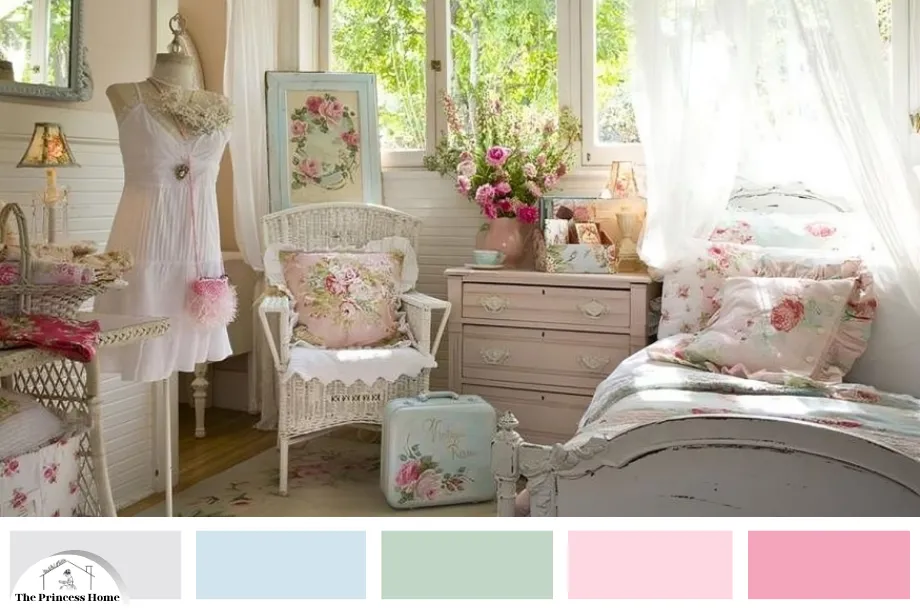
2.*Soft Color Palette:
Opt for a soft and muted color palette to create a serene and inviting atmosphere. Pastel hues such as soft blues, pale pinks, muted greens, and creamy whites are quintessential to shabby chic design. These gentle tones evoke a sense of tranquility and warmth, while also serving as the perfect backdrop for showcasing vintage pieces and floral accents. Consider incorporating subtle pops of color through accent pillows, throws, and artwork to add visual interest without overwhelming the space.
A soft color palette is like a whisper of tranquility in your space, isn’t it? Soft blues, pale pinks, muted greens, and creamy whites come together to create a serene atmosphere, perfect for unwinding after a long day. These gentle tones bring a sense of calm and warmth, embracing you like a cozy blanket.
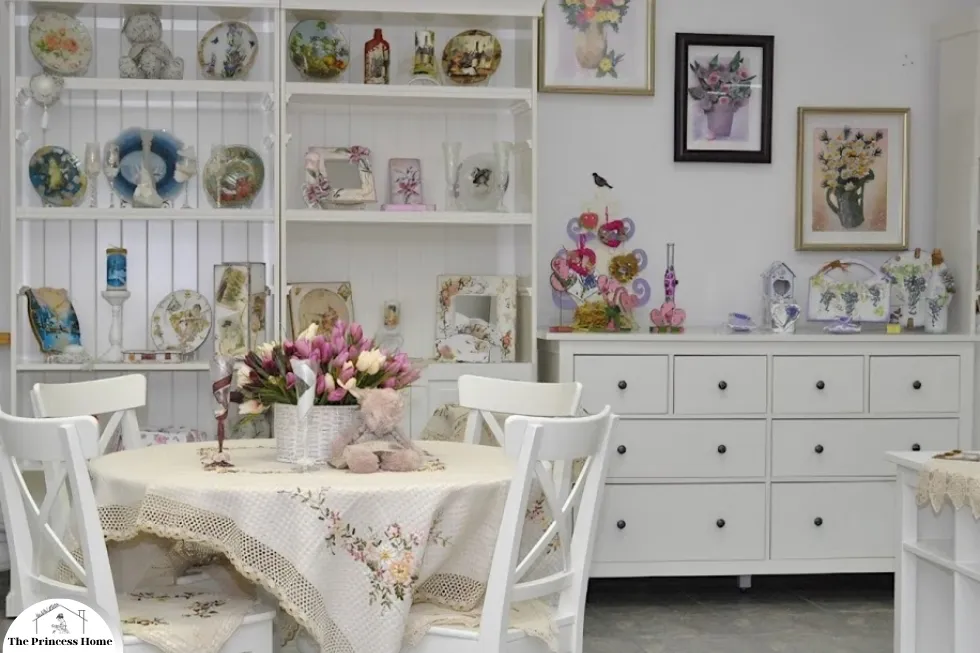
In a shabby chic design, these pastel hues play a starring role, setting the stage for vintage treasures and delicate floral accents to shine. Picture a room adorned with weathered wood furniture, adorned with soft blues and blush pinks, creating a timeless elegance.
To keep things interesting, consider adding subtle pops of color here and there – maybe through accent pillows in a soft coral or a throw blanket in a muted lavender. These touches add depth to the space without disrupting its peaceful vibe. With a soft color palette, every corner of your home becomes a sanctuary, inviting you to relax and recharge amidst its soothing hues.
Here are some tips to help you effectively implement a soft color palette in your space:
1.Start with a Neutral Base:
Begin by selecting a neutral base color, such as a soft white or a light gray, for walls and larger furniture pieces. This provides a clean canvas for your soft colors to shine while also helping to brighten the space.
2.Layer Soft Hues:
Introduce soft blues, pale pinks, muted greens, and other gentle tones through smaller decor items like throw pillows, curtains, rugs, and artwork. Layering these hues creates depth and visual interest without overwhelming the space.
3.Mix Textures:
Incorporate a variety of textures to add dimension to the room. Consider using materials like linen, cotton, and wool for upholstery, curtains, and rugs to enhance the cozy, inviting feel of the space.
4.Consider Natural Elements:
Bring in natural elements such as wood, rattan, and wicker to complement the soft color palette. These materials add warmth and texture while maintaining the organic, relaxed vibe of the shabby chic style.
5.Accent with Metallics:
Introduce metallic accents like brass, copper, or gold to add a touch of glamour and sophistication to the soft color scheme. Opt for subtle metallic finishes on light fixtures, mirrors, and decorative accessories to enhance the overall aesthetic.
6.Balance with Whites:
Use crisp white accents sparingly to balance out the soft hues and prevent the space from feeling too washed out. White trim, furniture legs, or decorative accents can help to create contrast and keep the room feeling fresh and airy.
7.Experiment with Patterns:
Incorporate subtle patterns like floral prints, stripes, or delicate geometric designs to add visual interest to the space. Mix and match patterns in similar color tones to maintain cohesiveness while adding depth to the overall design.
8.Personalize with Accessories:
Infuse your personality into the space with carefully curated accessories like vintage finds, family heirlooms, or cherished artwork. These personal touches add character and warmth, making the space feel truly unique and inviting.
By following these tips, you can create a serene and inviting atmosphere with a soft color palette that exudes tranquility and charm.
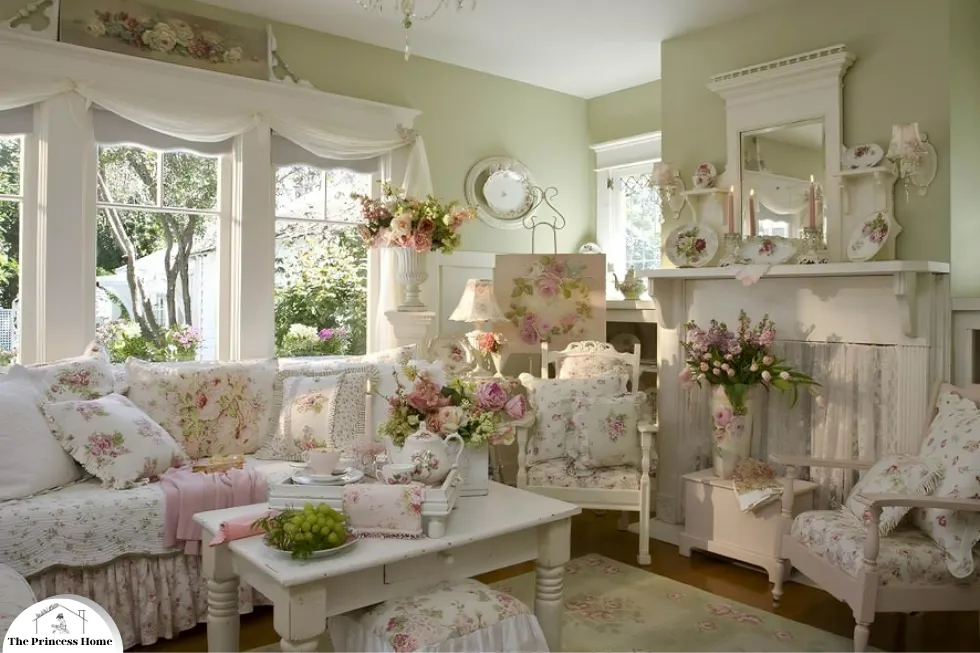
3.*Distressed Finishes:
Embrace the beauty of imperfection by incorporating distressed finishes into your décor. Whether it’s a vintage dresser with chipped paint or a weathered barn door used as a decorative accent, distressed finishes add authenticity and character to shabby chic spaces. You can achieve this look through various DIY techniques such as sanding, whitewashing, or using crackle paint to create a timeworn appearance.
Don’t be afraid to experiment with different methods to achieve the desired effect. Distressed finishes indeed lend an irresistible charm to any space, don’t they? They effortlessly infuse a sense of history and character into interiors, whether it’s a cozy farmhouse kitchen or a chic urban loft. The appeal lies in their ability to evoke a feeling of lived-in comfort while adding a touch of visual interest.
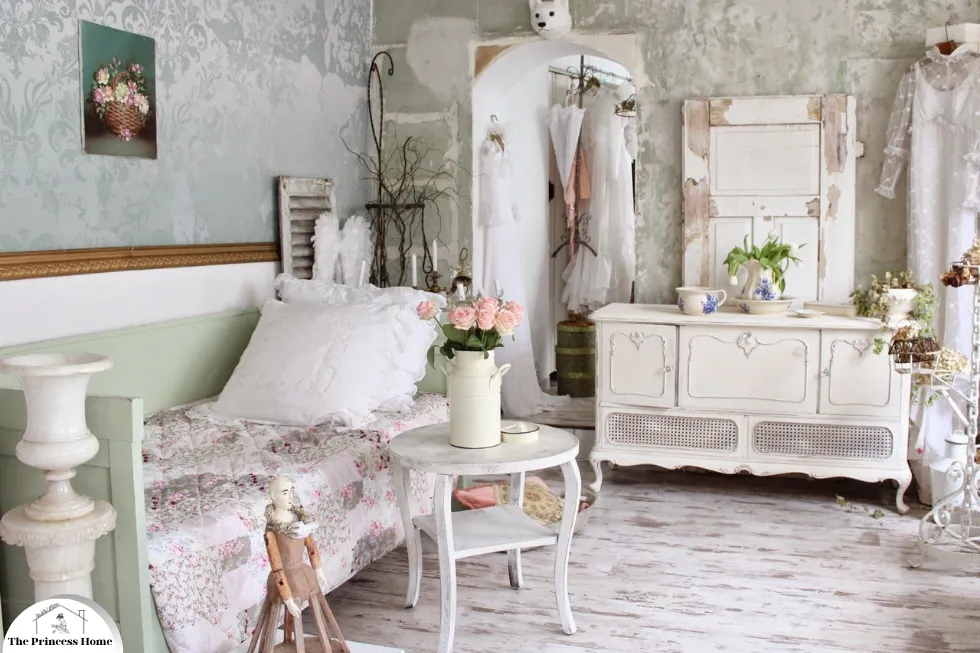
One of the best aspects of embracing distressed finishes is the freedom it offers for creativity. Each piece tells a story through its unique wear and tear, making it a conversation starter and a focal point of your decor. Plus, DIY techniques like sanding, whitewashing, or employing crackle paint allow for personalization, ensuring that your distressed pieces reflect your individual style and taste.
Whether you’re reviving an old piece of furniture or adding rustic accents to a contemporary space, distressed finishes are incredibly versatile. They effortlessly bridge the gap between old and new, creating a harmonious balance that’s both timeless and trendy. So, don’t hesitate to experiment and let your creativity run wild as you transform your space into a haven of rustic elegance!
Here are some tips to help you achieve the perfect distressed finish:
1.Choose the Right Piece:
Not all furniture or decor items are suitable for distressing. Look for pieces with natural wear and tear or those made of solid wood, as they tend to take distressing techniques better.
2.Prepare the Surface:
Before starting any distressing technique, ensure the surface is clean and free of dirt, grease, and old paint. Sand the surface lightly to create a smooth base for the distressing process.
3.Experiment with Techniques:
There are numerous distressing techniques to explore, including sanding, whitewashing, dry brushing, and crackling. Experiment with different methods on scrap wood or inconspicuous areas of your piece to find the look you desire.
4.Layering is Key:
For an authentic distressed look, consider layering multiple techniques. Start with a base coat of paint or stain, then add layers of different colors or textures to create depth and dimension.
5.Focus on High-Traffic Areas:
When distressing furniture, focus on areas that would naturally wear over time, such as edges, corners, and handles. This helps create a more realistic and lived-in appearance.
6.Use the Right Tools:
Invest in quality brushes, sandpaper, and other tools to ensure professional-looking results. Soft-bristled brushes and fine-grit sandpaper are ideal for achieving a subtle distressed finish.
7.Know When to Stop:
It’s easy to get carried away with distressing, but knowing when to stop is crucial. Step back periodically and assess your progress to avoid overdoing it.
8.Seal and Protect:
Once you’re satisfied with the distressed finish, seal the surface with a clear wax or polyurethane to protect it from further wear and tear.
By following these tips and letting your creativity guide you, you’ll be able to achieve stunning distressed finishes that add character and charm to your decor. Happy distressing!

4.*Floral Accents:
Infuse your home with the timeless charm of floral patterns and botanical motifs. From dainty floral prints to bold botanical wallpapers, incorporating florals into your décor adds a romantic and feminine touch to shabby chic interiors. Opt for vintage-inspired floral fabrics for upholstery, curtains, and throw pillows to bring a sense of nostalgia and whimsy to your space.
Additionally, fresh flowers and greenery can breathe life into any room, adding a natural element that enhances the overall ambiance. Incorporating floral accents into your home décor is a delightful way to infuse charm and elegance into your space. Whether you prefer subtle hints of floral patterns or bold botanical designs, there are numerous ways to embrace this timeless aesthetic.
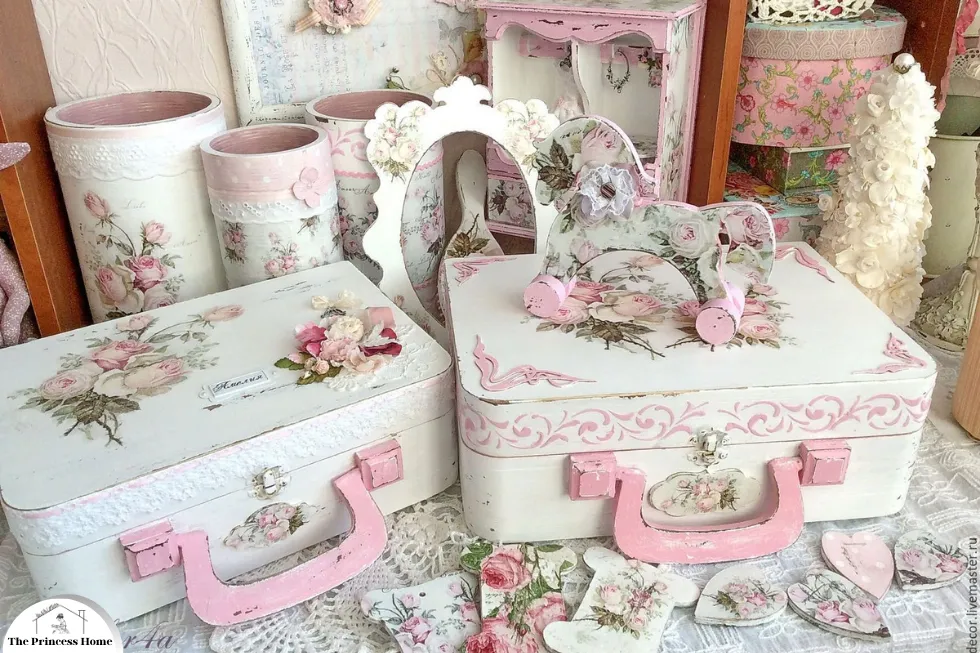
Start by choosing the right floral prints and motifs that complement your existing décor style. For a shabby chic look, opt for delicate floral patterns in soft pastel hues. Consider incorporating vintage-inspired fabrics for upholstery, curtains, and throw pillows to evoke a sense of nostalgia and whimsy.
Wallpapers featuring bold botanical designs can make a striking statement and serve as a focal point in any room. Choose wallpapers with large-scale floral motifs to create a dramatic effect, or opt for smaller prints for a more subtle touch.
To enhance the natural ambiance of your space, don’t forget to add fresh flowers and greenery. Place floral arrangements in vases or pots throughout your home to bring a burst of color and fragrance. Consider incorporating potted plants or hanging baskets to add a touch of greenery to your space, creating a serene and inviting atmosphere.
Here are some tips for incorporating floral accents into your home decor:
1.Mix Patterns Thoughtfully:
When using floral prints, mix them with other patterns thoughtfully. Pairing florals with stripes, geometrics, or solids can create visual interest without overwhelming the space.
2.Balance Boldness:
If you opt for bold floral wallpapers or large floral prints, balance them with neutral or solid-colored furniture and accessories. This helps prevent the space from feeling too busy or overwhelming.
3.Layer Textures:
Incorporate different textures alongside floral patterns to add depth and dimension to your decor. Mix in elements like woven baskets, plush rugs, and metallic accents to create a dynamic visual appeal.
4.Consider Scale:
Pay attention to the scale of floral prints. In smaller rooms, opt for smaller-scale floral patterns to avoid overpowering the space. In larger rooms, you can experiment with larger prints for a dramatic effect.
5.Accessorize with Florals:
Bring florals into your decor through accessories like throw pillows, blankets, rugs, and artwork. These smaller accents allow you to experiment with floral motifs without committing to larger pieces like furniture or wallpaper.
6.Use Fresh Flowers:
Incorporating fresh flowers is one of the easiest ways to add floral accents to your home. Place them in vases or jars throughout your space, and don’t forget to change them regularly to keep your decor feeling fresh and vibrant.
7.Create a Focal Point:
Use floral accents to create a focal point in your room. Whether it’s a statement wallpaper, a floral area rug, or a bold piece of furniture, let florals draw the eye and become a conversation starter.
8.Consider the Season:
Rotate your floral decor seasonally to reflect the changing seasons. Opt for bright and cheerful florals in spring and summer, and switch to deeper, richer hues in fall and winter.
9.Personalize with Florals:
Choose floral patterns and motifs that resonate with your personal style and preferences. Whether you prefer traditional roses, modern abstract florals, or tropical blooms, let your personality shine through in your floral decor choices.
10.Have Fun &Experiment:
Don’t be afraid to have fun and experiment with floral accents in your home decor. Mix and match different floral patterns, colors, and textures until you find a combination that feels just right for you.

5.*Mix &Match Furniture:
Shabby chic style embraces eclecticism, so don’t be afraid to mix and match different furniture pieces to create an eclectic yet cohesive look. Pair vintage finds with modern pieces to add contrast and visual interest to your space. Consider mixing different styles and materials, such as pairing a weathered wooden coffee table with a tufted linen sofa or combining wrought iron chairs with a distressed farmhouse dining table. The key is to create a harmonious balance between old and new elements while maintaining a sense of comfort and warmth.

Here are some tips for successfully mixing and matching furniture in a shabby chic style:
1.Start with a Theme:
Decide on the overall vibe you want to achieve. Shabby chic often combines vintage, rustic, and romantic elements, so keep this in mind when selecting furniture pieces.
2.Focus on Balance:
Aim for a balanced mix of old and new, light and dark, and different textures. This helps create visual interest without overwhelming the space.
3.Anchor with Key Pieces:
Choose a few statement pieces as the focal points of the room. These could be a distressed farmhouse table, a vintage chandelier, or a plush upholstered sofa.
4.Experiment with Contrasts:
Mix different styles, colors, and materials to add depth to your space. For example, pair delicate floral patterns with rugged wood textures or combine ornate details with simple, clean lines.
5.Consider Scale:
Pay attention to the size and scale of each furniture piece to ensure they complement each other and fit the proportions of the room.
6.Add Personal Touches:
Incorporate accessories like vintage mirrors, decorative pillows, and quirky art pieces to infuse your personality into the space.
7.Don’t Overcrowd:
While it’s tempting to fill every inch of space, resist the urge to overcrowd the room. Leave some breathing room between furniture pieces to allow for easy movement and a more relaxed atmosphere.
8.Cohesion with Color:
Use a cohesive color palette to tie everything together. This doesn’t mean everything has to match perfectly, but having a consistent color scheme helps create unity within the eclectic mix of furniture.
9.Layer Textures:
Incorporate a variety of textures such as distressed wood, soft fabrics, and metallic accents to add depth and visual richness to the space.
10.Trust Your Instincts:
Ultimately, trust your instincts and have fun with the process. Mixing and matching furniture is about expressing your personal style and creating a space that feels uniquely yours.
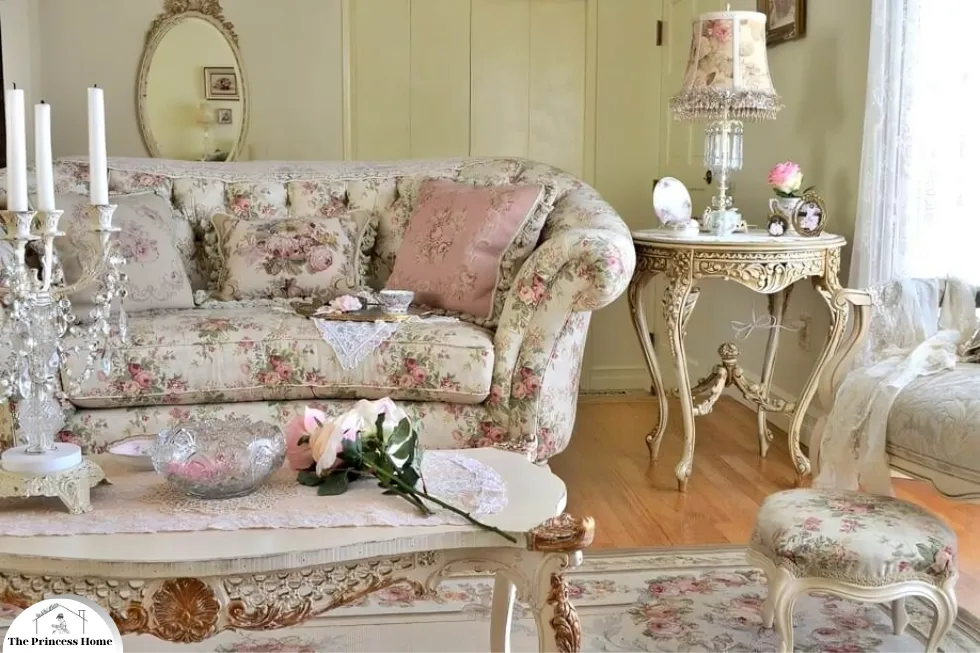
6.*Layered Textures:
Add depth and dimension to your space by layering textures throughout your décor. Incorporate a variety of tactile elements such as distressed wood, soft linens, cozy knits, and plush rugs to create a sense of coziness and warmth. Mixing textures not only adds visual interest but also creates a dynamic and inviting atmosphere.
Experiment with layering different textiles and materials to achieve a rich and luxurious look that is quintessentially shabby chic. Layering textures in a shabby chic style embraces the beauty of imperfection and vintage charm. Think of weathered wood, faded fabrics, and worn-in materials coming together to create a cozy, eclectic vibe.

Here’s how you can achieve a shabby chic look through layered textures:
1.Distressed Wood:
Incorporate furniture pieces or accent pieces with a distressed finish. Look for wooden tables, chairs, or shelves with chipped paint or worn edges. These pieces add character and rustic appeal to your space.
2.Soft Fabrics:
Choose soft, worn-in fabrics like linen or cotton for upholstery, curtains, and throw pillows. Opt for muted colors or delicate floral patterns to enhance the vintage aesthetic.
3.Vintage Textiles:
Integrate vintage textiles such as lace, crochet, or embroidered fabrics into your décor. Use them as tablecloths, doilies, or as accents in your upholstery to add a touch of nostalgia and femininity.
4.Mismatched Patterns:
Embrace the eclectic nature of shabby chic by mixing and matching different patterns and textures. Combine floral prints with stripes or polka dots for an effortless, lived-in look.
5.Layered Rugs:
Place multiple rugs of varying textures and sizes on your floors to create visual interest and add warmth to your space. Mix natural fiber rugs like jute or sisal with plush, patterned rugs for a cozy, layered effect.
6.Vintage Accessories:
Incorporate vintage accessories such as antique mirrors, frames, or decorative trinkets to enhance the shabby chic ambiance. These pieces add personality and charm to your space while reinforcing the eclectic aesthetic.
7.Worn-in Finishes:
Choose furniture with worn-in finishes or patinas, such as distressed metal or aged leather. These pieces add authenticity and depth to your shabby chic décor while evoking a sense of history and nostalgia.
By layering these textures thoughtfully, you can create a shabby chic space that feels inviting, cozy, and full of character. Don’t be afraid to mix and match different elements to achieve that perfectly imperfect look that defines shabby chic style.
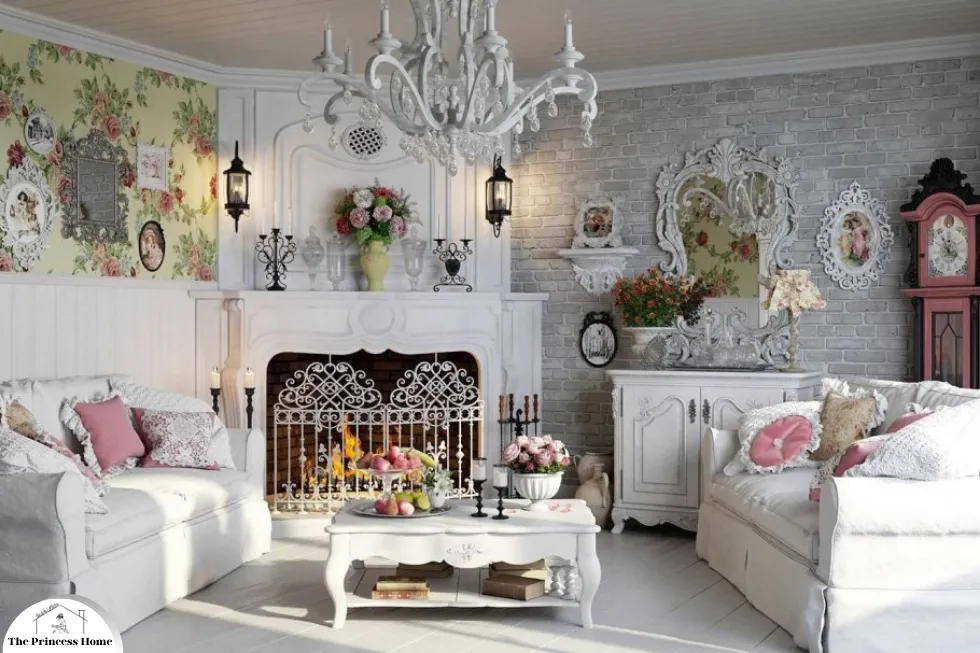
7.*Incorporate Vintage Accents:
Accessorizing plays a crucial role in achieving the shabby chic aesthetic. Look for vintage accents such as antique mirrors, ornate picture frames, crystal chandeliers, and delicate china to add elegance and refinement to your space. Displaying cherished heirlooms and flea market finds adds a personal touch to your décor while enhancing the vintage charm of your home.
Grouping similar items together, such as a collection of vintage teacups or antique books, creates visual impact and serves as a focal point in your room. Incorporating vintage accents is like sprinkling a touch of history and nostalgia into your shabby chic space, adding depth and character to every corner.
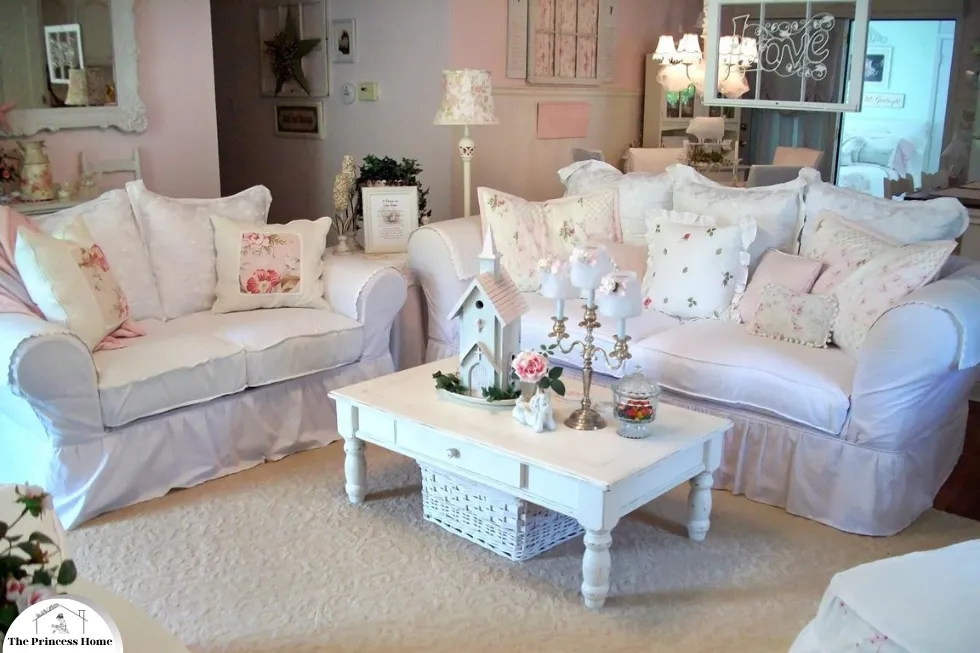
Here’s how you can master the art of vintage accessorizing:
1.Antique Mirrors:
Look for ornate, distressed mirrors with intricate frames to hang on your walls or lean against a mantel. These mirrors not only reflect light and visually expand your space but also add a touch of old-world elegance.
2.Ornate Picture Frames:
Display family photos or vintage-inspired artwork in ornate picture frames. Mix and match different sizes and styles to create an eclectic gallery wall or arrange them on a side table for a charming vignette.
3.Crystal Chandeliers:
Hang a sparkling crystal chandelier as a focal point in your room. Its delicate design and shimmering crystals will add a touch of glamour and sophistication to your shabby chic space, while also casting a warm, inviting glow.
4.Delicate China:
Showcase your collection of delicate china, whether it’s vintage teacups, floral plates, or intricately patterned serving dishes. Display them on open shelves, in glass cabinets, or even use them as decorative accents on tabletops or mantels.
5.Heirlooms &Flea Market Finds:
Incorporate cherished heirlooms or unique flea market finds into your décor to infuse your space with personal history and character. Whether it’s a vintage clock passed down through generations or a quirky trinket discovered during a weekend treasure hunt, these pieces add soul to your shabby chic home.
6.Grouping Similar Items:
Create visual impact by grouping similar vintage items together. Arrange a collection of vintage teacups on a decorative tray or stack antique books on a coffee table. Grouping items not only creates a focal point but also adds layers of interest and texture to your space.
By incorporating these vintage accents thoughtfully, you can create a shabby chic space that exudes elegance, refinement, and personal charm. Let your creativity shine as you curate a collection of treasures that tell the story of your home’s unique style and history.
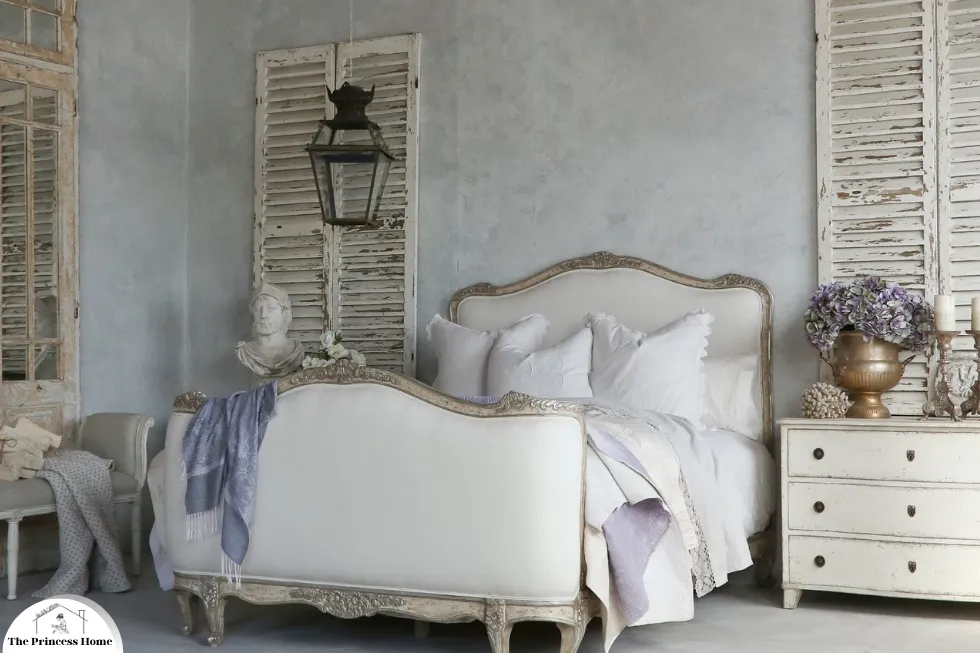
8.*Architectural Elements:
Incorporating salvaged architectural elements into your décor adds a sense of history and authenticity to shabby chic spaces. Consider repurposing old doors, windows, and shutters as decorative accents or focal points in your home. Vintage corbels, ceiling tiles, and salvaged wood beams can also add architectural interest and rustic charm to your space.
These reclaimed elements not only infuse your home with character but also contribute to a sustainable and eco-friendly design ethos. Salvaged architectural elements are like pieces of history woven into the fabric of your shabby chic space, adding unique character and rustic charm.

Here’s how you can incorporate these treasures into your décor:
1.Repurposed Doors &Windows:
Turn old doors into statement pieces by using them as decorative accents or repurposing them as functional furniture pieces, such as a headboard or a tabletop. Similarly, repurpose vintage windows as wall art or room dividers to add architectural interest and visual appeal.
2.Shutters and Blinds:
Salvaged shutters or blinds can be repurposed as decorative wall hangings, room dividers, or even headboards for beds. Their weathered patina and distressed finish add texture and depth to your shabby chic space, while also serving as a nod to the past.
3.Vintage Corbels &Ceiling Tiles:
Incorporate vintage corbels as decorative shelf brackets or use them to frame a doorway or window. Vintage ceiling tiles can be repurposed as decorative wall panels or used to create a unique backsplash in kitchens or bathrooms. These architectural elements add intricate detail and visual interest to your décor.
4.Salvaged Wood Beams:
Salvaged wood beams bring warmth and rustic charm to any space. Use them as decorative accents on ceilings or walls to add architectural interest and create a cozy, inviting atmosphere. You can also repurpose them as mantels, shelves, or even furniture pieces for a truly one-of-a-kind look.
5.Sustainable Design:
By incorporating salvaged architectural elements into your décor, you’re not only adding character to your space but also contributing to a sustainable and eco-friendly design ethos. Reusing materials that would otherwise end up in landfills helps reduce waste and minimize environmental impact, making your shabby chic space both beautiful and socially responsible.
Incorporating salvaged architectural elements into your shabby chic décor adds a layer of history, authenticity, and sustainability to your space. Whether it’s repurposed doors, vintage corbels, or salvaged wood beams, these reclaimed treasures infuse your home with character and charm, creating a truly unique and inviting atmosphere.
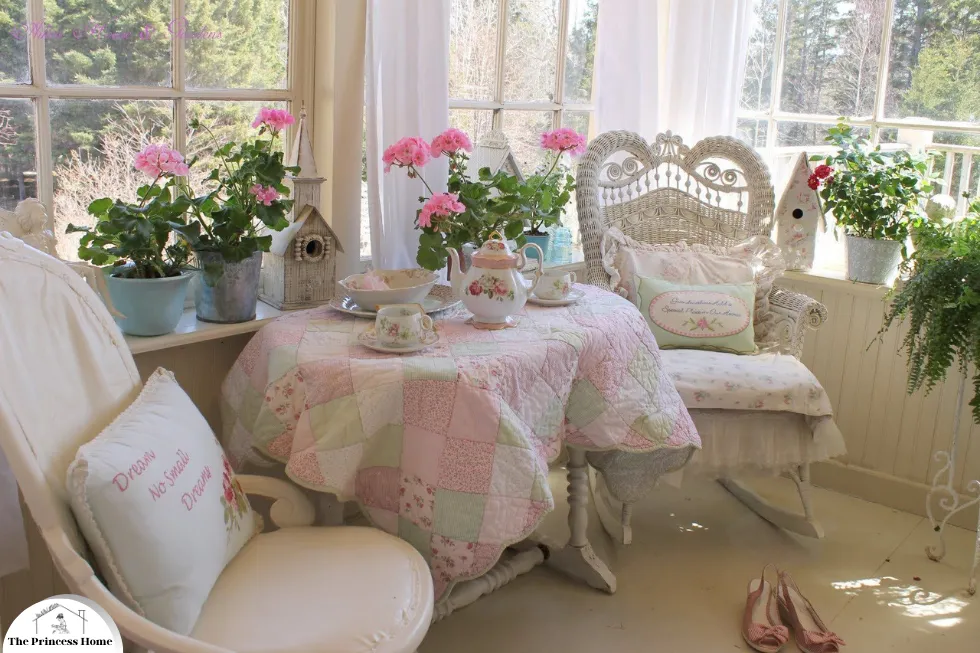
9.*Create Cozy Nooks:
Shabby chic style is all about creating cozy and inviting spaces where you can relax and unwind. Create cozy nooks throughout your home by incorporating plush seating, soft textiles, and ambient lighting. Consider adding a reading corner with a comfortable armchair, a pile of throw pillows, and a vintage floor lamp for cozying up with a good book.
Window seats adorned with cushions and throws offer the perfect spot for enjoying a cup of tea while soaking in natural light and scenic views. Creating cozy nooks in your shabby chic home is like carving out little havens of comfort and relaxation amidst the hustle and bustle of daily life.

Here’s how you can curate these inviting spaces:
1.Reading Corner:
Designate a corner of your home as a cozy reading retreat. Place a plush armchair or chaise lounge adorned with soft cushions and throws. Add a small side table to hold your favorite books and a vintage floor lamp to cast a warm, inviting glow. Surround the area with potted plants or a vintage rug to create a serene atmosphere perfect for escaping into a good book.
2.Window Seat:
Transform a sunny window into a charming window seat where you can bask in natural light and scenic views. Install a cushioned bench or pile up cushions and throws to create a comfortable seating area. Add a small table or ottoman for resting drinks or snacks, and hang sheer curtains to diffuse the light and create a cozy ambiance. This spot is ideal for sipping tea, daydreaming, or simply enjoying a moment of tranquility.
3.Cozy Alcove:
Utilize alcoves or recessed areas in your home to create intimate and snug retreats. Install built-in seating or place a loveseat or settee against the walls. Layer with plush cushions, throws, and accent pillows for added comfort. Hang soft drapes or curtains to create privacy and ambiance, and adorn the space with vintage-inspired artwork or decorative accents for a touch of shabby chic charm.
4.Fireplace Nook:
If you have a fireplace, consider creating a cozy seating area around it. Arrange comfortable armchairs or a small sofa facing the fireplace, and accessorize with soft throws and oversized floor pillows. Place a rustic wooden crate or vintage trunk nearby to store extra blankets or firewood, and hang a decorative mirror or artwork above the mantle to add visual interest.
By incorporating these cozy nooks into your shabby chic home, you’ll create inviting retreats where you can unwind, recharge, and embrace the art of slow living. Whether you’re curling up with a book, enjoying a cup of tea, or simply soaking in the ambiance, these spaces will become your favorite sanctuaries within your home.
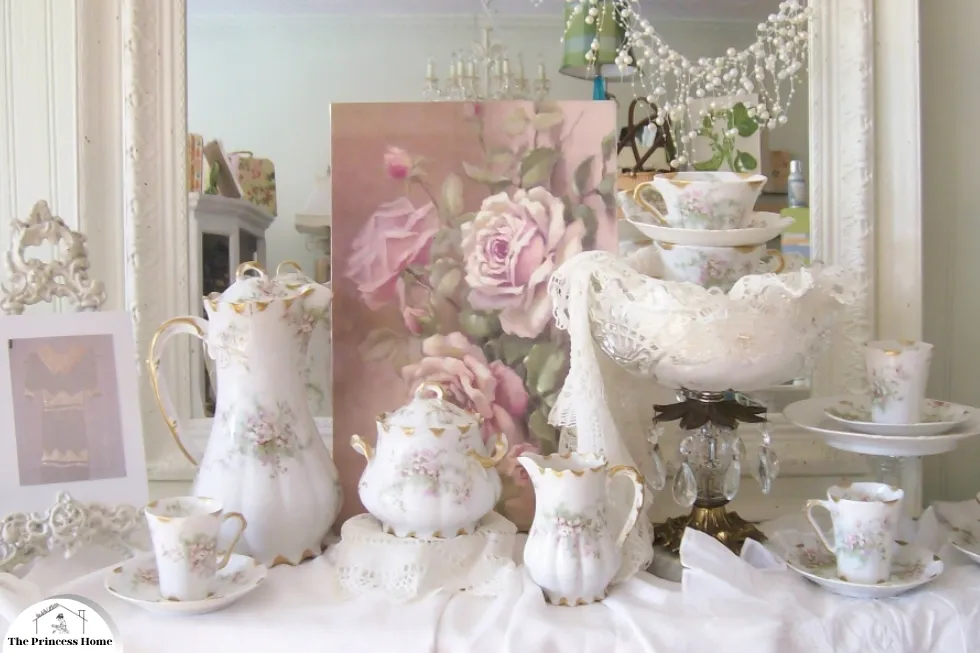
10.*Personalize Your Space:
Above all, shabby chic style is about creating a home that reflects your unique personality and style. Don’t be afraid to inject your own personal touches into your décor, whether it’s displaying cherished mementos, incorporating meaningful artwork, or showcasing your favorite vintage finds. Y
our home should tell a story and evoke emotions, so surround yourself with items that bring you joy and inspire creativity. By infusing your space with personal touches, you’ll create a home that feels truly authentic and inviting. Personalizing your shabby chic space is like weaving the tapestry of your life into the fabric of your home, creating a sanctuary that’s uniquely yours.
Here’s how you can infuse your space with personal touches and meaningful accents:
1.Cherished Mementos:
Display items that hold sentimental value and remind you of special moments or loved ones. Whether it’s family photos in vintage frames, travel souvenirs, or heirloom treasures passed down through generations, these mementos add a personal touch to your décor and tell the story of your life.
2.Meaningful Artwork:
Showcase artwork that resonates with you on a personal level. Whether it’s a painting by your favorite artist, a print that captures a cherished memory, or a DIY creation that reflects your creativity, choose pieces that evoke emotions and inspire you every time you look at them.
3.Favorite Vintage Finds:
Incorporate vintage finds that speak to your individual style and interests. Whether you’re drawn to antique furniture, retro décor, or quirky collectibles, let your personality shine through in your choice of vintage pieces. These treasures add character and charm to your space while reflecting your unique taste.
4.Handcrafted Creations:
Integrate handmade or DIY creations into your décor to add a personal and unique touch. Whether it’s a crocheted throw pillow, a hand-painted accent wall, or a macramé plant hanger, these handmade touches infuse your space with warmth and creativity.
5.Personal Collections:
Display collections that reflect your passions and hobbies. Whether you collect vintage teacups, antique books, or vinyl records, showcasing your collections adds personality and depth to your décor while expressing your interests and individuality.
6.Customized Details:
Add customized details to your space to make it truly your own. Whether it’s monogrammed linens, personalized artwork, or custom-made furniture pieces, these personalized touches add a sense of exclusivity and make your home uniquely yours.
By infusing your shabby chic space with personal touches and meaningful accents, you’ll create a home that not only looks beautiful but also feels authentic and inviting. Surround yourself with items that bring you joy, tell your story, and inspire creativity, and watch as your home becomes a true reflection of who you are.
Conclusion:
Mastering the art of shabby chic décor is all about embracing the beauty of imperfection, celebrating vintage charm, and creating a space that exudes warmth and personality. By incorporating vintage finds, soft color palettes, distressed finishes, floral accents, and eclectic furnishings, you can transform your home into a timeless sanctuary that reflects your unique sense of style. With these tips and strategies, you’ll be well on your way to creating a shabby chic oasis that feels both elegant and effortlessly relaxed.
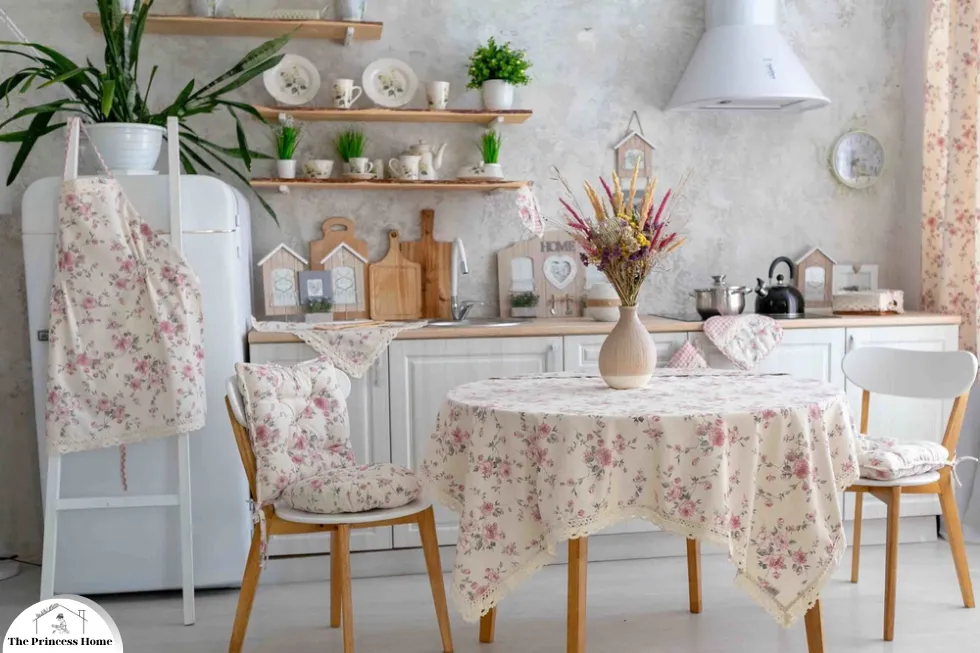


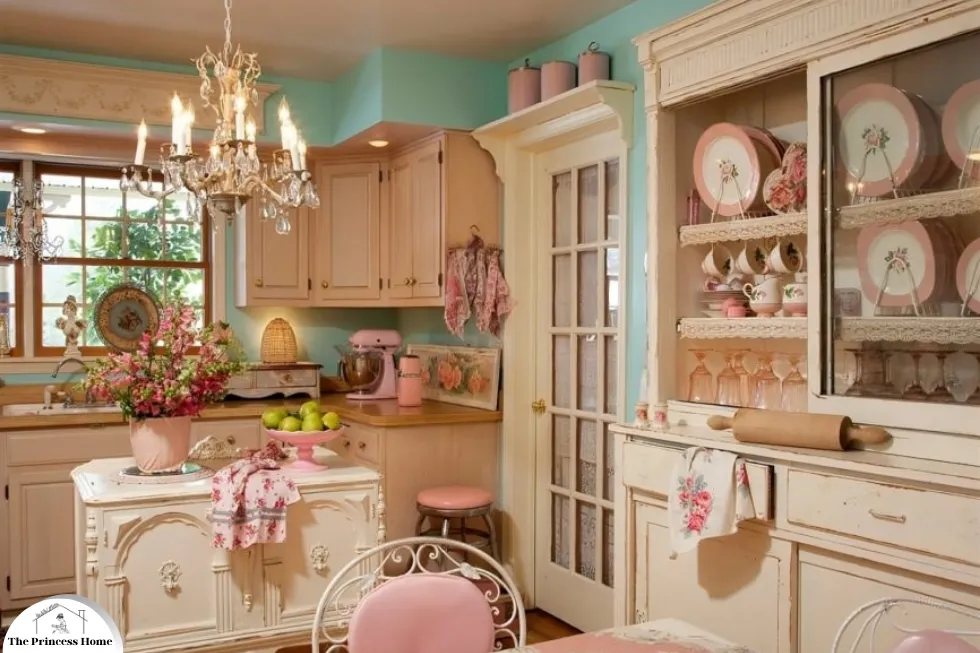

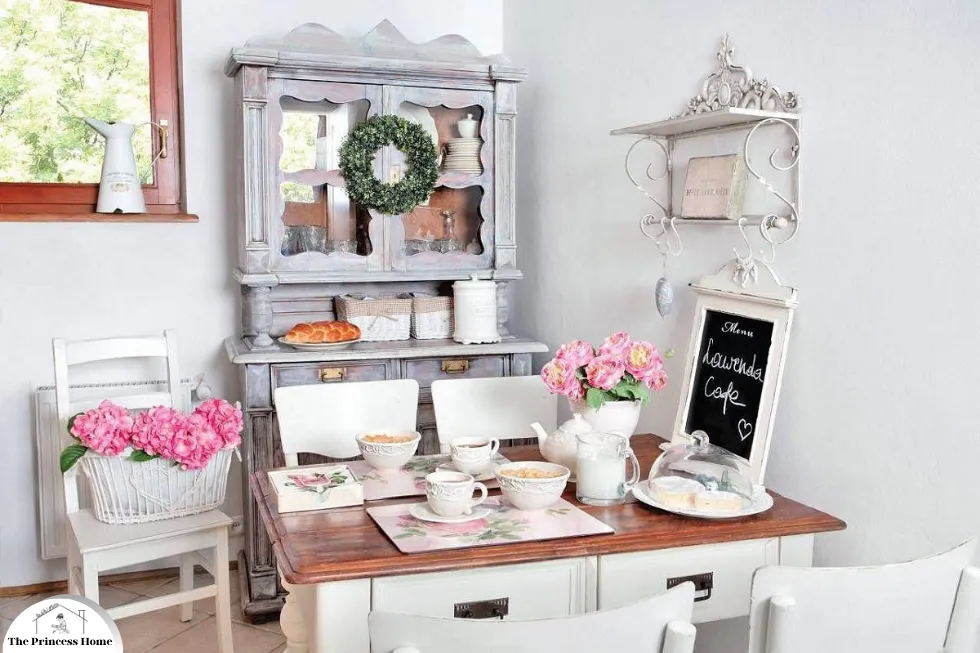

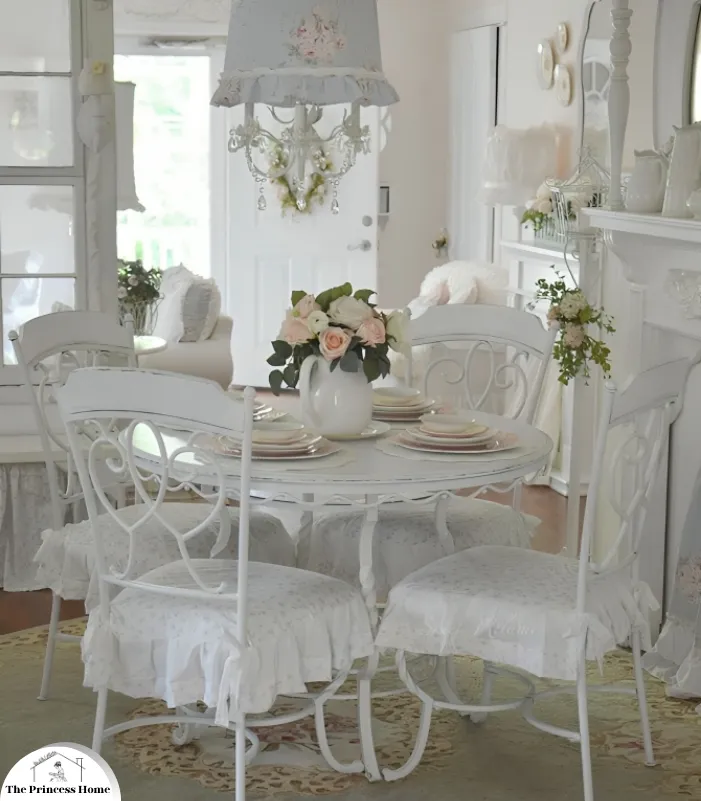


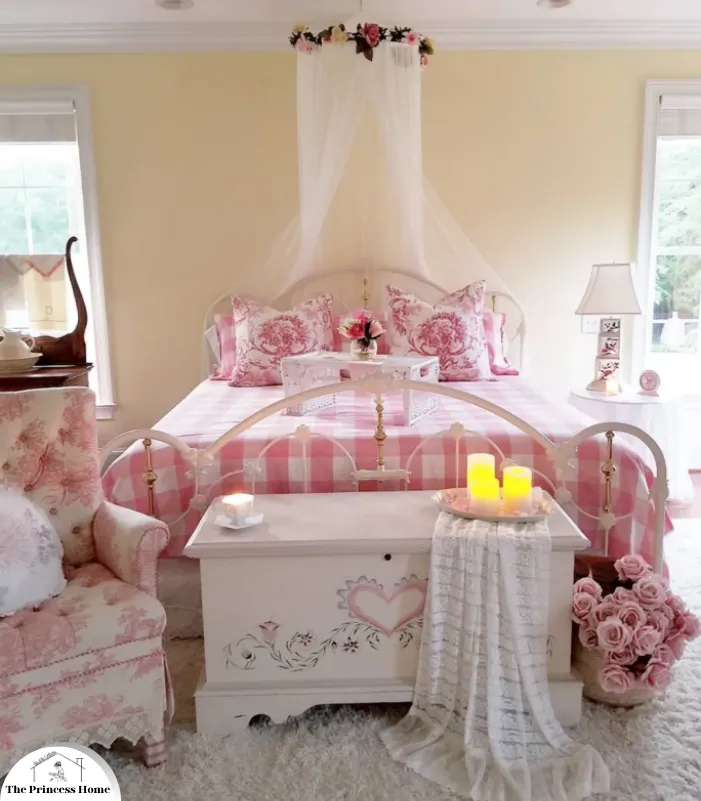
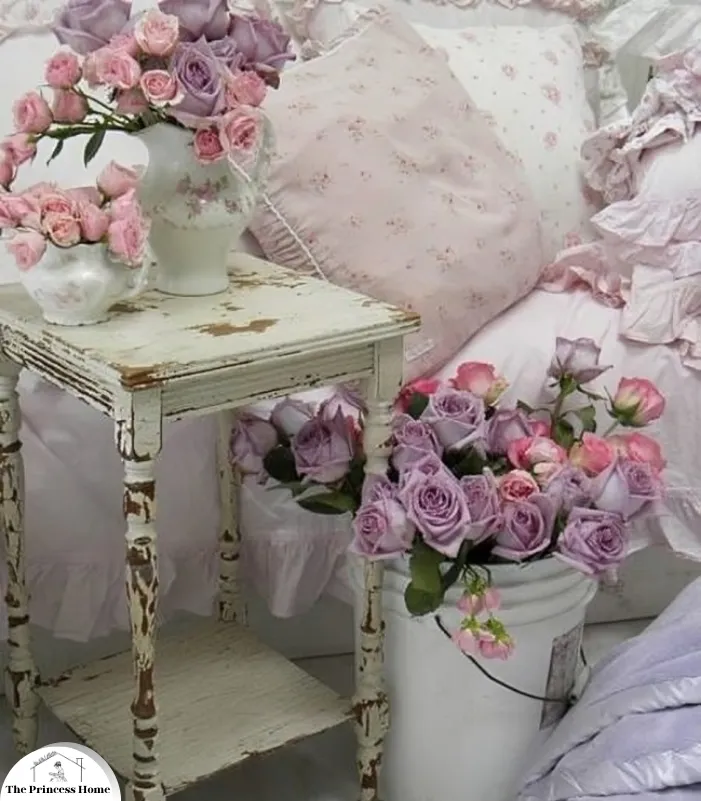

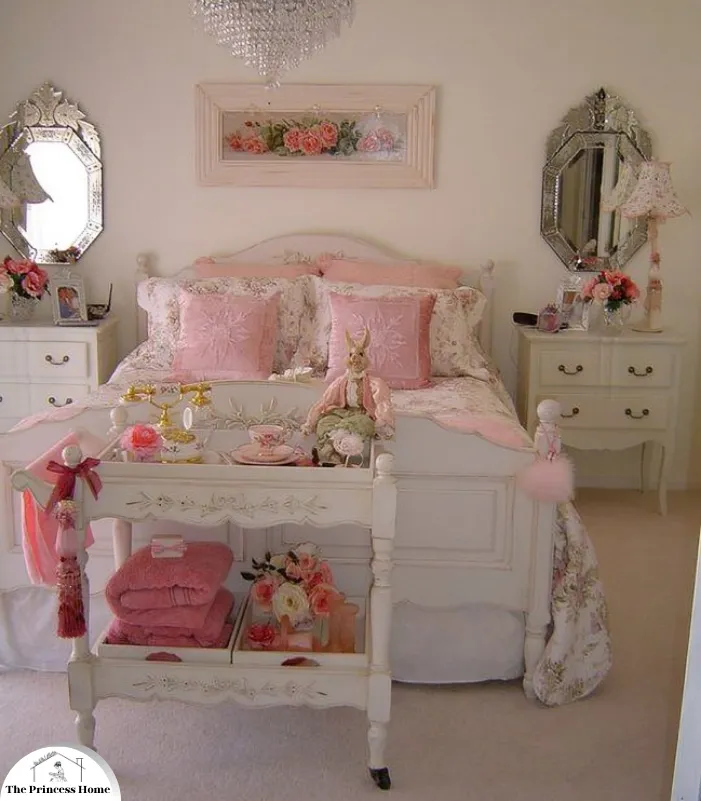
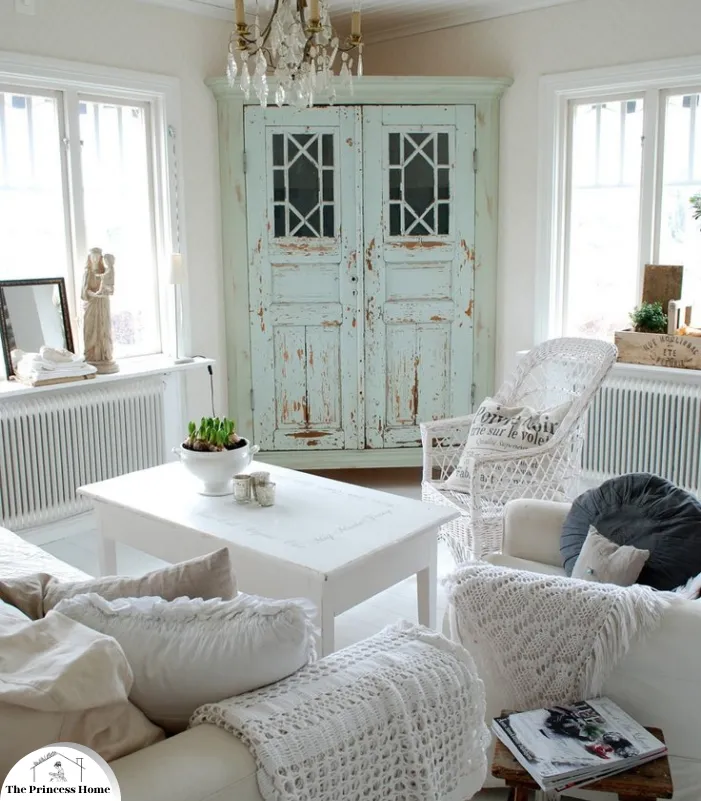
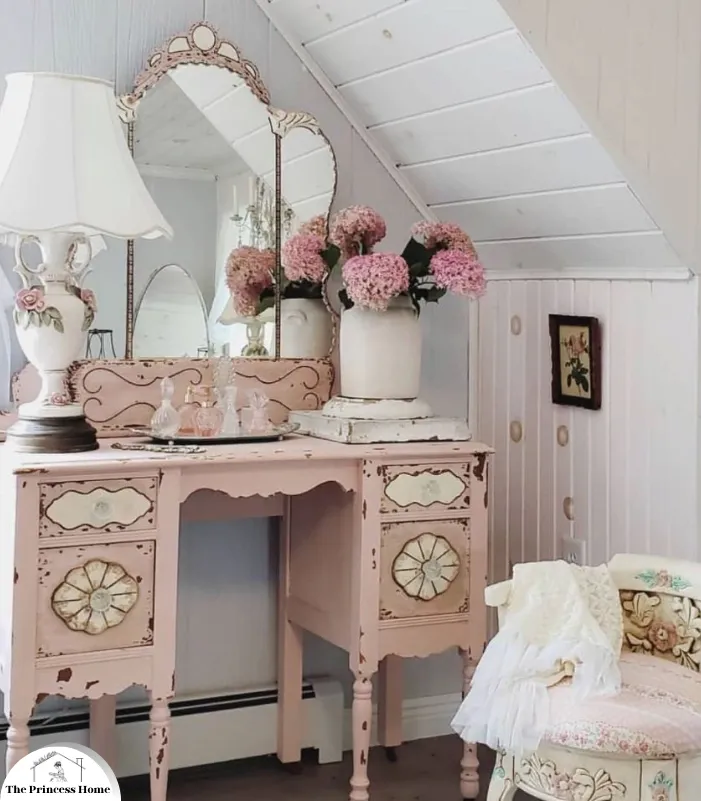



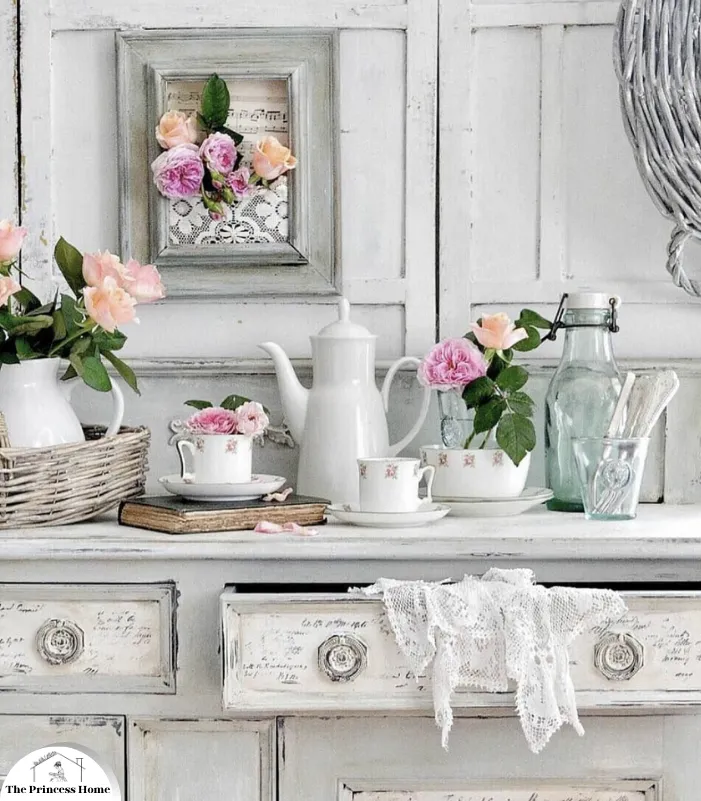
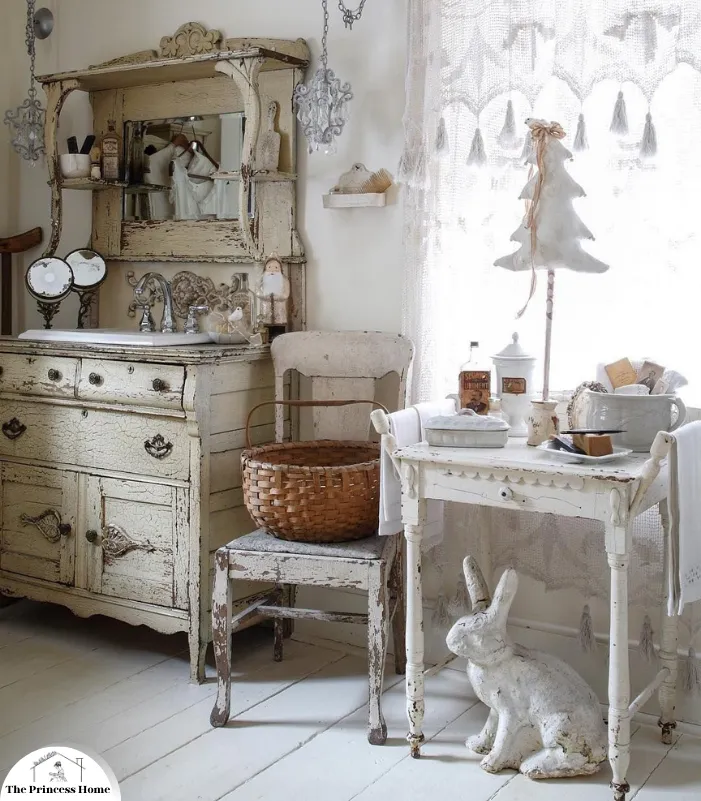


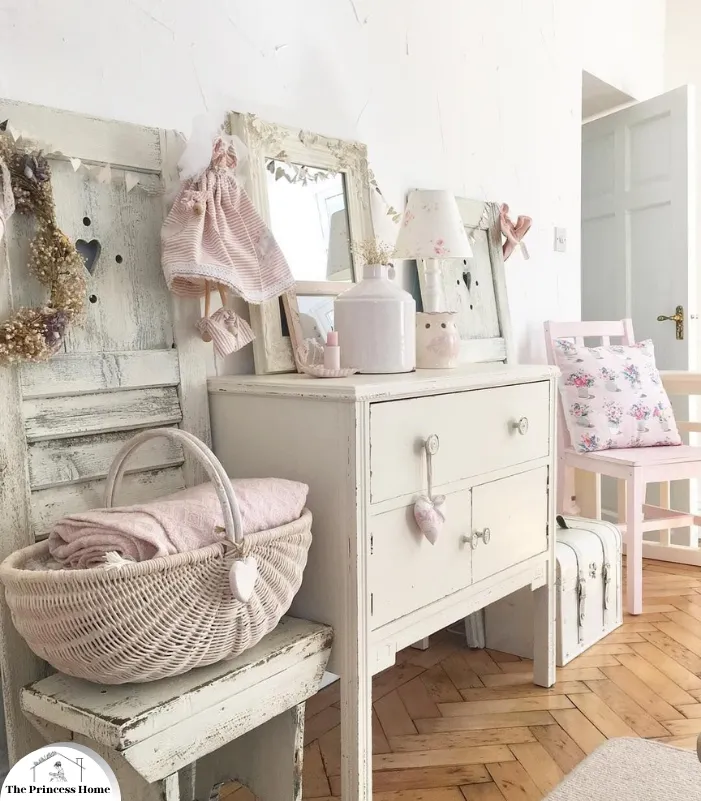
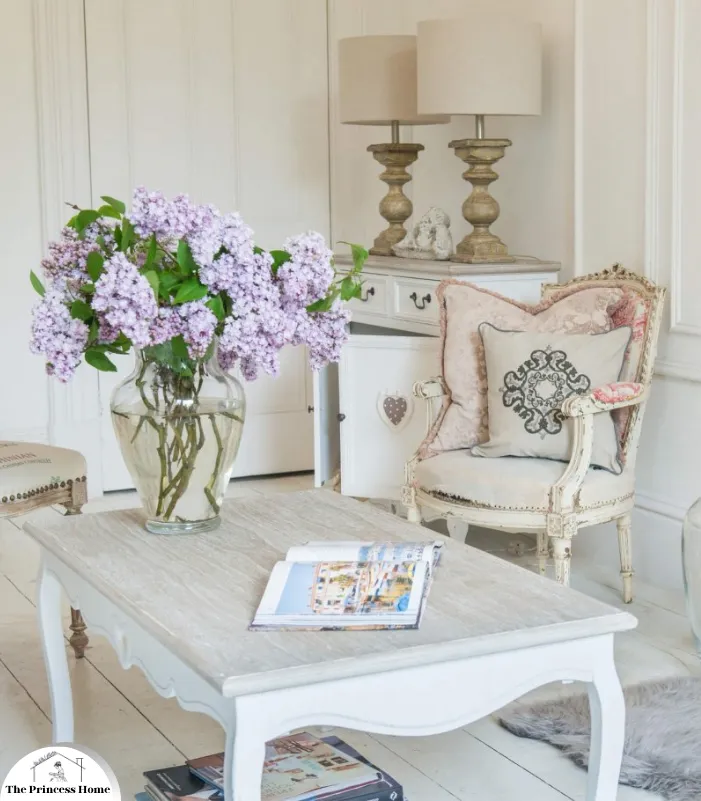
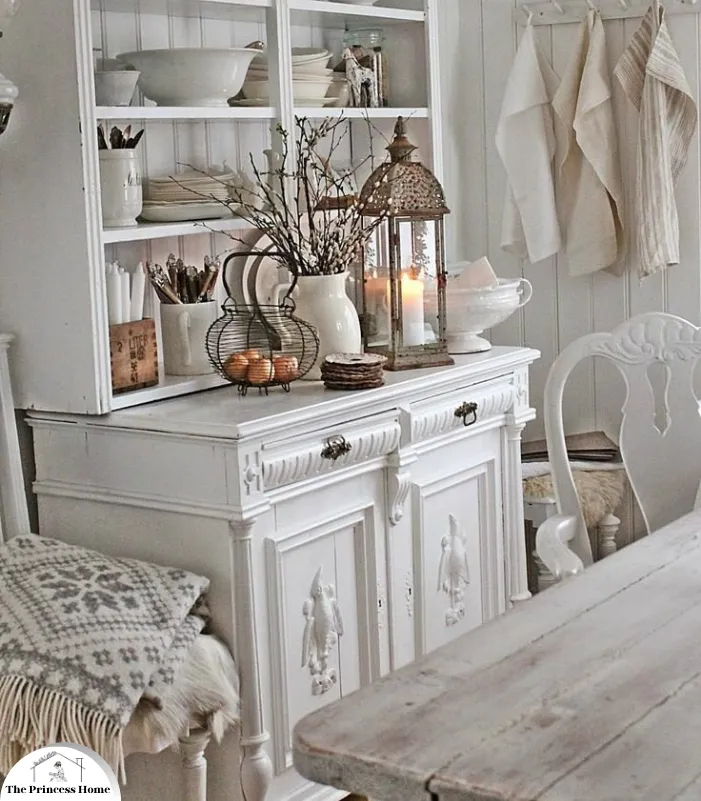

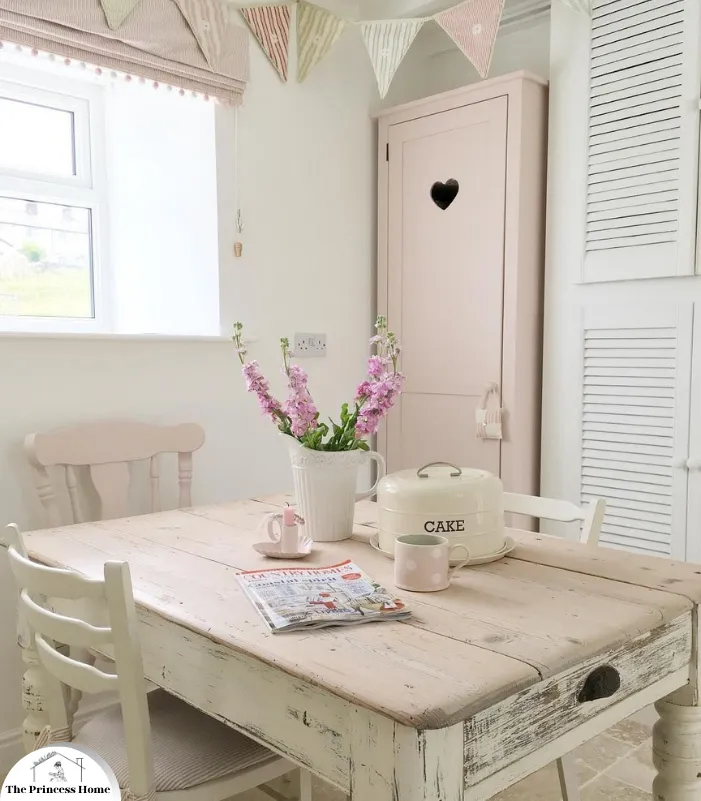

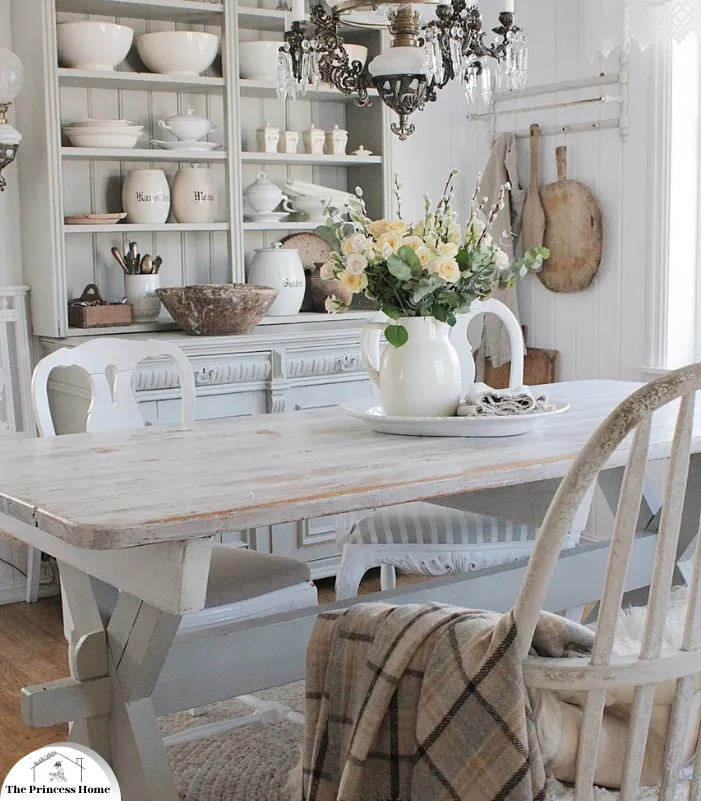
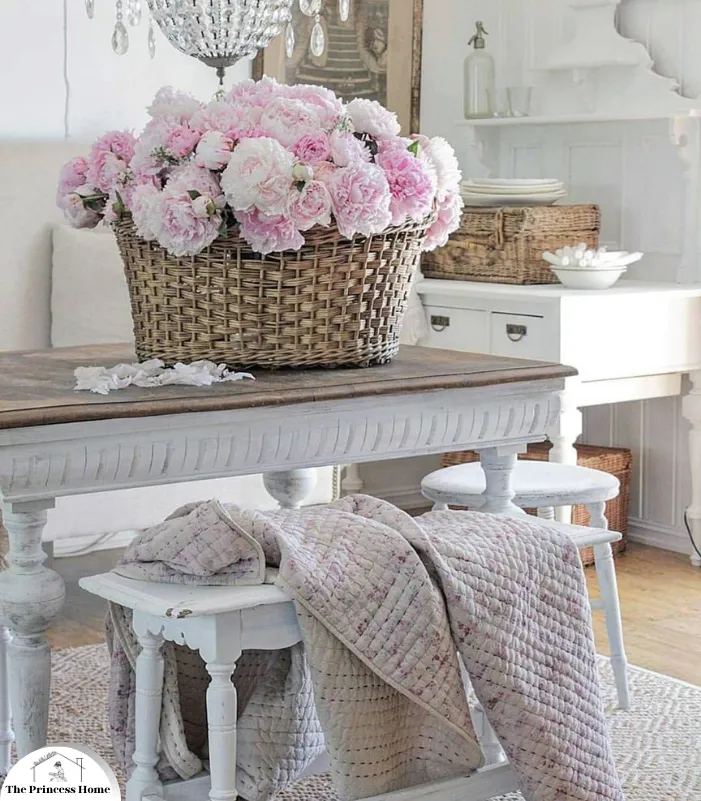
Here are some frequently asked questions related to shabby chic style and their corresponding answers:
Q1: What is shabby chic style?
A: Shabby chic style is an interior design aesthetic that combines vintage elegance with relaxed comfort. It draws inspiration from English country cottages and French countryside homes, incorporating elements such as distressed furniture, soft color palettes, floral accents, and eclectic décor.
Q2: How can I incorporate shabby chic style into my home?
A: To incorporate shabby chic style into your home, focus on using vintage furniture and décor pieces, opting for soft and muted color palettes, embracing distressed finishes, incorporating floral accents, mixing and matching furniture styles, layering textures, and adding personal touches that reflect your unique style and personality.
Q3: Where can I find vintage furniture and décor for shabby chic decorating?
A: Vintage furniture and décor for shabby chic decorating can be found at flea markets, antique shops, thrift stores, estate sales, and online marketplaces. Keep an eye out for unique finds with character, such as weathered wooden tables, antique picture frames, vintage mirrors, and ornate accessories.
Q4: Can I mix shabby chic style with other design aesthetics?
A: Yes, shabby chic style can be mixed with other design aesthetics to create a personalized and eclectic look. Consider blending shabby chic with modern, rustic, bohemian, or farmhouse elements to add contrast and visual interest to your space while maintaining a sense of comfort and warmth.
Q5: What are some DIY techniques for achieving distressed finishes in shabby chic décor?
A: Some DIY techniques for achieving distressed finishes in shabby chic décor include sanding, whitewashing, using crackle paint, and distressing with tools like sandpaper or steel wool. Experiment with different methods to achieve the desired level of distress and vintage charm.
Q6: How can I create a cozy nook in my home with shabby chic style?
A: To create a cozy nook with shabby chic style, start by selecting a comfortable seating option such as an armchair or window seat. Layer soft textiles such as throw pillows, blankets, and curtains to add warmth and texture. Incorporate ambient lighting with vintage-inspired lamps or string lights, and personalize the space with meaningful artwork, books, and décor accents.
Q7: Is shabby chic style suitable for all rooms in the home?
A: Yes, shabby chic style can be adapted to suit any room in the home, from living rooms and bedrooms to kitchens and bathrooms. Whether you prefer a more formal or casual approach, you can incorporate shabby chic elements to create a cohesive and inviting atmosphere throughout your home.
